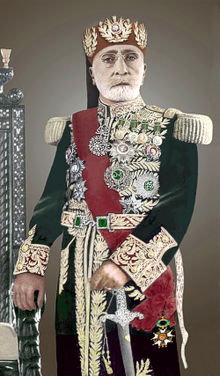Muhammad VIII al-Amin
| Muhammad VIII | |||||
|---|---|---|---|---|---|
| Bey of Tunisia | |||||
 |
|||||
| Reign | 15 May 1943 - 25 July 1957 | ||||
| Predecessor | Muhammad VII | ||||
| Successor |
Husain Bey as Pretender 30 September 1962 And Habib Bourguiba As President of Tunisia |
||||
| Born |
September 4, 1881 Carthage, French Protectorate Tunisia |
||||
| Died | September 30, 1962 (aged 81) Tunis, Tunis Governorate Tunisia |
||||
| Burial | Tomb of King Muhammad al-Amin, Sidi Abdulaziz, La Marsa | ||||
| Spouse | Lalla Janina Beya | ||||
|
|||||
| Name in Arabic | الأمين باي بن محمد الحبيب | ||||
| Dynasty | Husainid Dynasty | ||||
| Father | Muhammad VI al-Habib | ||||
| Mother | Lalla Fatima bint Muhammad | ||||
| Religion | Sunni Islam | ||||
| Full name | |
|---|---|
| Muhammad al-Amin |
Muhammad VIII al-Amin (4 September 1881 – 30 September 1962) (Arabic: الأمين باي بن محمد الحبيب, al-Amīn Bāy bin Muḥammad al-Ḥabīb) was the last bey of Tunisia (15 May 1943 and 20 March 1956). He was the first head of state (as king or bey) of independent Tunisia from 1956 until he was deposed in 1957. He was the son of Muhammad VI al-Habib, bey of Tunis.
Muhammad became bey after the Free French Forces deposed his cousin Muhammad VII al-Munsif on the accusation that he was a Vichy collaborator. He proclaimed the independence of Tunisia on 20 March 1956 and became King of Tunisia with the style of His Majesty. A monarchy did not meet the expectations of future president Habib Bourguiba, who replaced the Royal Guard at Carthage Palace with his own loyal soldiers. By his command all the telephone lines to the palace were cut and the king put under house arrest 15 July 1957, and on 25 July the Tunisian Constituent Assembly deposed the king.
Muhammad was moved to a government-watched residence at La Manouba, but was permitted to return to Tunis after his wife died. He never abdicated his throne rights. He died in Tunis and was buried at the Tomb of King Muhammad al-Amin. Muhammad was succeeded as head of the Husainid Dynasty and heir to the throne and titular king by Husain Bey.
...
Wikipedia
